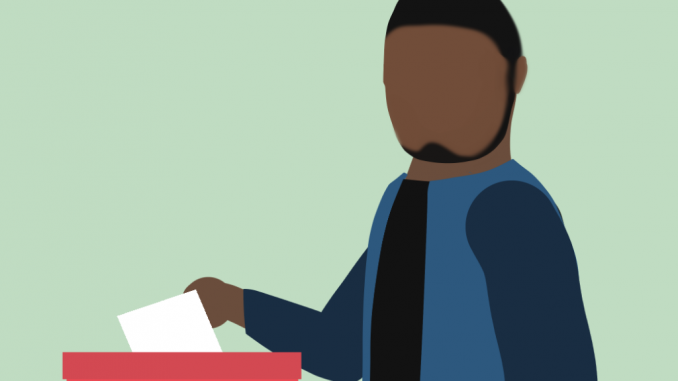
I remember shuffling in line on a cloudy October morning, my mom, brother and I finally entering Anna B. Day School and receiving our ballots. We sat at one of several lunch tables and began filling them out.
At 21, it was my first presidential election, and coming from a liberal family, voting was a no-brainer: go all Democrat. But aside from knowing the candidates’ political party, I didn’t know what they stood for, where they were from or what their track record was.
All I thought about that morning was getting Joe Biden in office and getting myself home. But I should have felt empowered to vote, like other Black people, because our ancestors fought for our freedoms like voting.
Instead, I’ve taken voting and other civil rights for granted. It’s only tragedies like George Floyd’s death that make me realize I should be more knowledgeable about the legal system and my rights as a United States citizen.
Floyd’s death brought attention to Black people and the struggles we go through. People protested around the world to disavow racism, and protests in Philadelphia got so heated that Mayor Jim Kenney gave the city a curfew back in June 2020.
Despite the extensive media coverage of Floyd and the protests, I never felt the full impact of his death because I avoid conversations about race-related violence. The conversations remind me that as a Black man, my life is just as fragile as Floyd’s.
The first time I had these conversations was in 2012, when my seventh-grade math teacher told my classmates and I about Trayvon Martin’s death.
My teacher, Mrs. Price, a Black woman in her 40s, paced back and forth in front of the classroom, she hadn’t turned on the projector. Nothing was written on the whiteboard.
She began explaining the gruesome details of Martin’s death. She said it was ridiculous that a teen carrying Skittles could be killed just because he wore a hoodie.
Halfway through her talk, my classmates spoke up and discussed times they experienced racism. Having lived in a mixed, quiet neighborhood, I never experienced racism, so I remained silent.
I barely had an understanding of the law then and still don’t, but the death of Martin made me feel obligated to learn. An innocent, Black teen, if I had worn a hoodie at the wrong place and time, it could have just as easily been me who was the victim.
Knowing this, I tried to grab every word that my teachers and peers were saying.
As the years went on, so did the murders of innocent people: Michael Brown, Tamir Rice, Freddie Gray. Every racist killing of Black people since Martin’s death has ended with their killers getting away with the crime while the family of the deceased pours their heart out on television.
The narrative is the same every time, and it makes me depressed and enraged. I always turn the TV off in a fit and try to clear my head.
If I knew the complexities of the laws encompassed in these situations, like Miranda rights, I could analyze the murders instead of reacting emotionally. If I knew what the officers would do, I would be able to protect myself. But the effort required to study the law has always intimidated me.
I know I can’t become an expert in politics overnight. Jumping from political unawareness to marching in protests with Black Lives Matter is a huge leap, but if I make a start, I can better protect myself, my loved ones and even a stranger.
It’s all about taking progressive steps. I can learn the Constitution’s amendments and the laws in Philadelphia.
I can learn who my politicians are and what they are doing to combat racism, and as my knowledge grows, I’ll become politically aware.


Be the first to comment